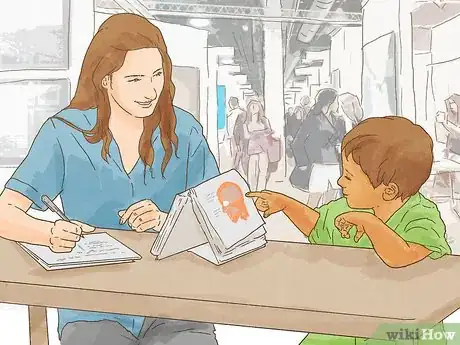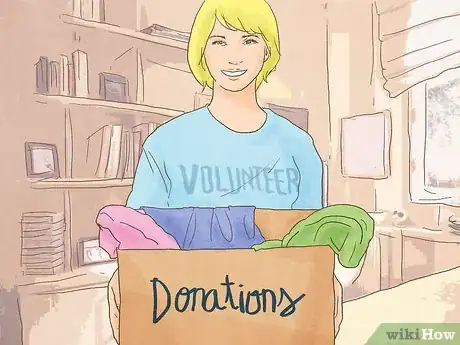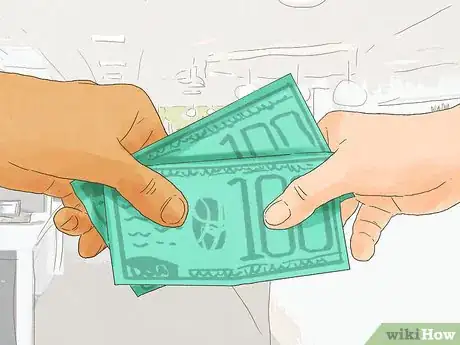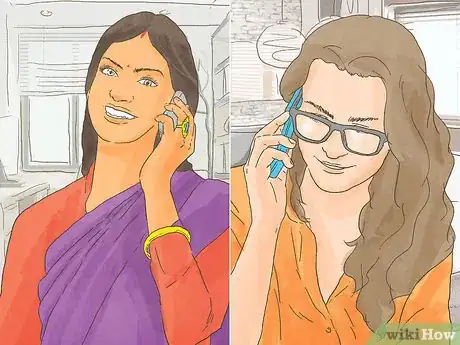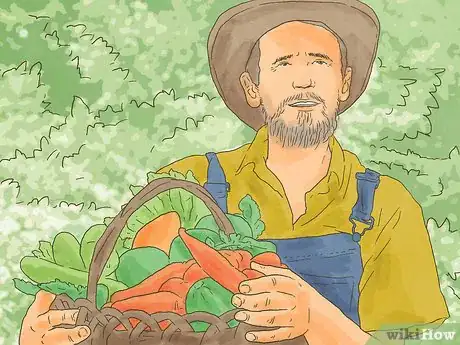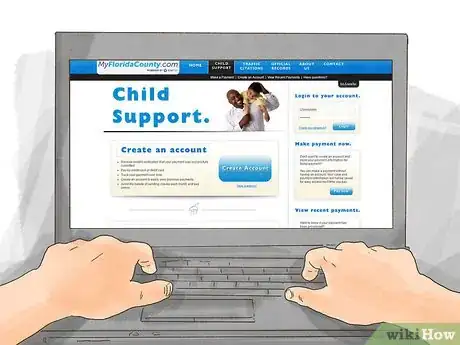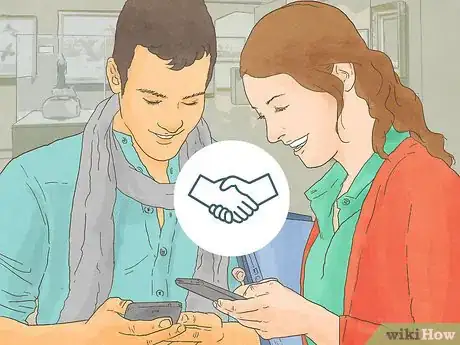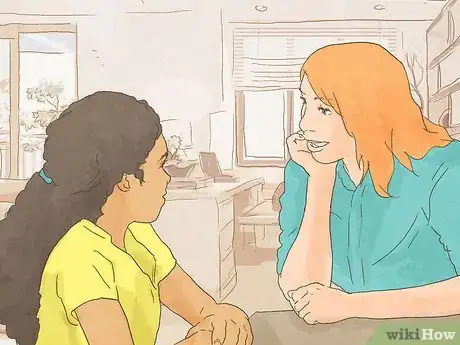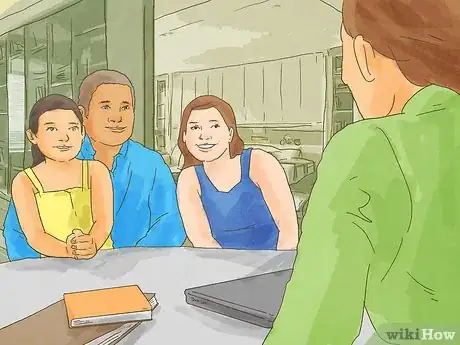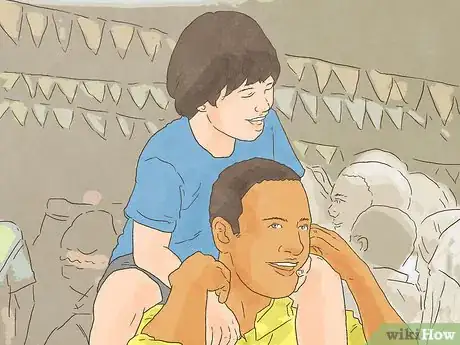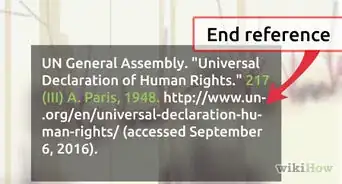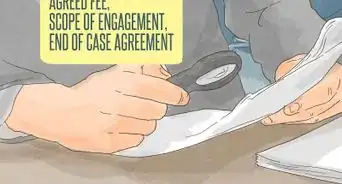This article was co-authored by Asa Don Brown, PhD, DNCCM, FAAETS. Dr. Asa Don Brown is a Clinical Psychologist with over 25 years of experience. He specializes in working with families, children, and couples, treating a variety of psychological disorders, trauma, and abuse. Dr. Brown has specialized in negotiation and profiling. He is also a prolific author having published three books and numerous articles in magazines, journals, and popular publications. Dr. Brown earned a BS in Theology and Religion with a minor in Marketing and an MS in Counseling with a specialization in Marriage and Family from The University of Great Falls. Furthermore, he received a PhD in Psychology with a specialization in Clinical Psychology from Capella University. He is also a candidate for a Masters of Liberal Arts through Harvard University. Dr. Brown is a Fellow of the American Academy of Experts in Traumatic Stress and a Diplomate for the National Center for Crisis Management and continues to serve a number of psychological and scientific boards.
There are 23 references cited in this article, which can be found at the bottom of the page.
wikiHow marks an article as reader-approved once it receives enough positive feedback. This article has 16 testimonials from our readers, earning it our reader-approved status.
This article has been viewed 180,418 times.
Millions of children around the world lack access to basic necessities, such as food, clean water, sanitation, medicine, shelter, education, books, fun, family, laughter, love - but there is hope. You can help poor children have a better future in a number of ways. Volunteering your time and efforts to children can make a very big impact. You could also raise money or donate goods to charity. If you are willing to make a commitment, you can become a personal advocate for a child in need through mentoring and fostering. No effort is too small or too large to make.
Steps
Volunteering
-
1Tutor underprivileged students. Education is one of the best predictors of success in children. You can help struggling students succeed in school by donating your time or money as a tutor or a regular person. You might tutor children in reading, spelling, current events, Algebra, writing, cursive, Math, Science, History, and/or English as a Second Language.[1]
- You can contact any of your local school board and/or schools themselves to see if they have an after-school program/club to tutor children.
- Some people choose to go abroad to teach impoverished children who might not have access to good schools.
-
2Hold a clothes and books drive. Many children do not have basic necessities. New clothes, books, and toys can make a big difference in their life. Working with a group of people, collect lightly used or new supplies for children. Identify a local charity, such as the Salvation Army, that would be willing to distribute these for you. Some things you can collect include:
- School supplies
- Gifts for the holidays
- New shoes
- Coats, sweaters, and other cold weather clothing
- Textbooks
- Musical instruments
Advertisement -
3Sponsor an impoverished child. There are around 400 million children worldwide living in extreme poverty.[2] For a small monthly donation, you can help one child pay for food, school, medicine, and clothes. There are many charities that offer to help you sponsor a child, both at home and abroad. Some reputable ones include:
-
4Contact local charities. Some charities might need volunteers to help organize inventory, supervise events, and distribute aid. Call your local branch of a child welfare charity to see what they need. Ask them how you can best volunteer your time.
- If you are a professional with particular skills, you might be able to offer your services free of charge to help reduce administrative costs for the charity. This allows the charity to devote their resources to helping children. Services you might be able to offer include accounting, contracting work, and legal aid.
- If your charity is holding a fundraiser or event, you can offer to help out. You might be asked to help sell tickets, run a booth, or clean up afterwards.
Raising Money for Charity
-
1Decide what type of aid you want to give. Money can go a long way in helping a charity reach out to poor children, but you should think about where you want your money to go to. Many charities allow you the option to choose how to spend the money. You can decide to send your money towards:
- Food
- School tuition and fees
- Medical care
- Books and toys
- Clothes
- Clean water
- Shelter
- Supporting an orphanage
-
2Choose a respected children's cause to support. There are many different children’s charities. Some are focused towards a specific cause, such as education or healthcare. Others are for the general welfare of children. Before you donate money to a charity, research the charity to make sure that they provide the majority of their funds to their cause. Check Charity Navigator to see if they have at least a three star rating.[6] Some reputable charities include:
-
3Publicize your cause. While you can give out of your own pocket, you might also want to encourage other people to donate as well. Advertise your charity of choice to friends and family. Encourage others to chip in so that your money can have a larger impact. You might consider publicizing your cause through:
- Social media such as Facebook, Twitter, or Instagram
- Blogs
- Video appeals
- Your personal website
-
4Sell goods. One great way to raise money for children is to sell something and give the proceeds to charity. You can set up a stall in front of your house, at a school, or during a farmer's market. Advertise your sale as a charity benefit. You may find that strangers are willing to buy things just to help out a good cause. Some different types of sales include:
- Yard sale
- Hand-crafted goods such as bracelets or scarves
- Bake sale
- Lemonade stand
-
5Crowdfund donations. Crowdfunding platforms allow you to set up a special page to raise money for a nonprofit of your choice. These webpages can attract many small donations from a large pool of people. There are many crowdfunding websites that specialize in fundraising for charities. You might consider using:
Transforming Yourself into a Personal Advocate
-
1Become a mentor. There are several organizations that help needy children connect with stable adults who can guide them through school and life. These programs offer at-risk youth a vital support system. Kids who have a mentor are more likely to graduate high school and less likely to abuse drugs or alcohol.[15] Some mentoring programs include:
-
2Apply to be a court-appointed special advocate (CASA). Children in foster care often do not have legal guardians who can represent them. A court-appointed special advocate is a representative who looks out for the best interests of a child in court. While they are not an attorney, they do represent foster children in court instead of a parent or legal guardian. CASAs often form personal bonds with their children, thus ensuring that they are protecting the rights and needs of the child.[19]
- You can locate a CASA program near you on the CASA for Children website.[20]
- You will have to undergo a thirty-hour training program before you will be assigned a case.
-
3Consider fostering a child. If you have the space and finances to take in a child, you can foster a child. Foster care is intended to provide a temporary, stable home for a child who has been removed from their parents.[21] The process for fostering takes months, but a dedicated foster parent can change the life of a disadvantaged child by providing support, stability, and consistency during a tumultuous time in their life.
- In the US, you will have to apply to be a foster parent at your state Department of Child Services or Department of Social Services. You will have to complete training and pass both a home inspection and a background check.[22]
- In the UK, you can contact your local council for more information or find a nearby fostering agency. You will have to pass a Discourse and Barring Service Check as well as a health exam. You may have to go through training.[23]
- In Australia, you will have to submit both an Expression of Interest Form and an application to your state Department for Child Protection and Family Support. You will have to pass a background check and a training session.
- In Canada, you should check with your provincial government to determine the proper procedure for fostering. You may be asked to complete a background check, medical examination, and home interview.
-
4Start your own non-profit. If you are passionate and dedicated to helping disadvantaged children, you may want to consider starting your own non-profit charity. Starting a charity requires extensive work, including special tax preparation, fundraising, resource management, and organizational structure. Before deciding if this is the right move for you, you should ask yourself:
- What kinds of services might this charity provide to my local area?
- Is there any other charity in my area that offers the same or similar services? If there is, you may just want to volunteer for that charity instead.
- How will the charity fund itself?
- Who will be needed to help run the charity? Think about other managers, fundraisers, accountants, tax lawyers, and volunteers.
Community Q&A
-
QuestionIs it illegal for someone to take poor kids as their children in order to care for them?
 NY BlossomTop AnswererIf you see poor children and take them without parental consent, this is kidnapping. Instead, offer to help provide them with recourses and donate to local charities.
NY BlossomTop AnswererIf you see poor children and take them without parental consent, this is kidnapping. Instead, offer to help provide them with recourses and donate to local charities. -
QuestionHow can I give to the poor as a kid?
 Community AnswerYou can help by fundraising or canning. Canning is gathering canned or non-perishable food items for donations, and can often be done near grocery stores or community events with permission.
Community AnswerYou can help by fundraising or canning. Canning is gathering canned or non-perishable food items for donations, and can often be done near grocery stores or community events with permission. -
QuestionHow can I help a specific child I saw in the street if his parents are in jail?
 Community AnswerMake him a special care packet with food, water, a blanket and some toys.
Community AnswerMake him a special care packet with food, water, a blanket and some toys.
Warnings
- You might not be able to save all children, but you can make a difference in one child’s life.⧼thumbs_response⧽
- Always work with reputable charities that are registered as non-profits.⧼thumbs_response⧽
Expert Interview
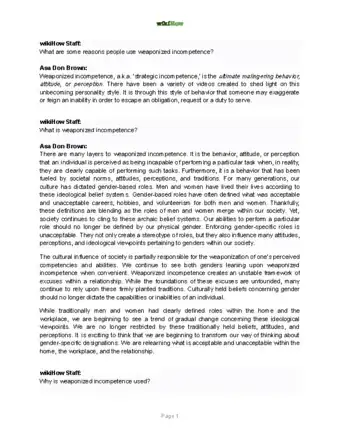
Thanks for reading our article! If you'd like to learn more about being a humanitarian, check out our in-depth interview with Asa Don Brown, PhD, DNCCM, FAAETS.
References
- ↑ https://wol.iza.org/opinions/tutoring-an-effective-solution-to-help-disadvantaged-children
- ↑ https://www.worldbank.org/en/news/press-release/2013/10/10/report-finds-400-million-children-living-extreme-poverty
- ↑ https://www.children.org/
- ↑ https://www.worldvision.org/sponsor-a-child
- ↑ https://support.savethechildren.org/site/SPageNavigator/sponsorship.html
- ↑ https://www.charitynavigator.org/
- ↑ https://www.unicef.org/
- ↑ https://www.bbcchildreninneed.co.uk/fundraisinghub
- ↑ https://www.stjude.org/
- ↑ https://childrensmiraclenetworkhospitals.org/about-us/
- ↑ https://www.charitynavigator.org/index.cfm?bay=search.summary&orgid=12579
- ↑ https://reachoutandread.org/
- ↑ https://www.causes.com/
- ↑ https://www.indiegogo.com/how-it-works
- ↑ https://youth.gov/youth-topics/mentoring/benefits-mentoring-young-people
- ↑ https://www.bbbs.org/
- ↑ https://childaid.org/programs/youth-mentoring/community-based-mentoring/
- ↑ https://www.standupforkids.org/what-we-do/mentoring
- ↑ https://nationalcasagal.org/
- ↑ https://nationalcasagal.org/advocate-for-children/be-a-casa-gal-volunteer/
- ↑ https://www.childwelfare.gov/pubPDFs/f_fospar.pdf
- ↑ https://www.adoptuskids.org/adoption-and-foster-care/how-to-adopt-and-foster/getting-approved
- ↑ https://www.gov.uk/foster-carers/becoming-a-foster-carer
- ↑ https://www.charitynavigator.org/
About This Article
If you want to help poor children to have a better future, there are a variety of ways to raise money or volunteer your time. You can sponsor a charity directly to help impoverished children with food, education, medical care, and shelter. Or, you can volunteer at a local children’s charity in your free time. If you have children yourself, you can hold a drive with other parents to collect old clothes, books, and toys and donate these to a local charity. Alternatively, you can hold a bake sale or yard sale and donate the money you make to charity. If you don’t have time for that, set up a crowd fund online and share it on social media. For more tips, including how to choose a children’s charity to donate money to, read on.
